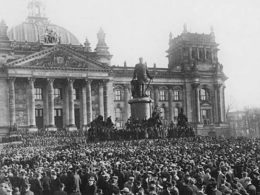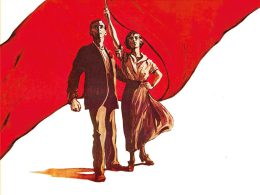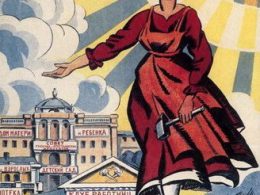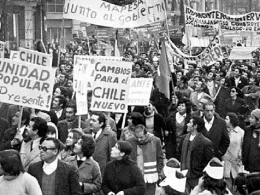Seventy years ago the greatest living revolutionary of the time, Leon Trotsky, was murdered by Josef Stalin’s hit man Ramon Mercader. There had been a number of failed previous attempts on Trotsky’s life but this time a fatal blow from an ‘ice pick’ successfully destroyed the ‘brain’ of the working class and the symbol of implacable opposition to capitalism and totalitarian Stalinism. This event, celebrated in the Kremlin by Stalin and the bureaucratic elite he represented, also brought joy to the capitalist governments of Europe, America and the world.
Capitalists attempt literary assassination of Trotsky’s ideas
Robert Service, who in his recent ‘biography’ has carried out a new assassination of Trotsky, this time of a political and literary kind, approvingly quotes the words of Winston Churchill to the Russian ambassador in Britain at the time of the notorious Moscow Trials, which laid the basis for Trotsky’s murder: “I’ve kept an eye on his activities for some time. He’s Russia’s evil genius, and it is a very good thing that Stalin has got even with him.”
If by killing Trotsky they thought they could destroy his ideas they were profoundly mistaken. Succeeding generations – the most politically aware layers – when they have moved into struggle against capitalism and Stalinism looked for explanations and inspiration in the works of Trotsky. Even in the post-1989 period of ideological counter-revolution his ideas still proved attractive. Now, confronted by the worst economic crisis of capitalism since the 1930s and the resulting inevitable mass revolt of the working class and poor, the ideologues of capitalism fear the influence of the ideas of Trotsky. They are conscious, or half conscious at least, that in a period of mass revolt figures like Che Guevara, who is seen as fighting for socialism and national liberation but opposing the bureaucracy, and Leon Trotsky are looked towards. In order to close off a road to the new generation, a campaign to discredit Trotsky is necessary. This is the purpose of books like those of Robert Service and others that have been produced in the last year.
“Show me who your friends are and I will show you who you are.” Service is a ‘pal’ of the current governor of the Bank of England and butcher of the welfare state, Mervyn King. He seeks to create the unbelievable impression that Trotsky, who was assassinated by Stalin, along with its most of his family and the heroic generation which he represented, is nevertheless a blood brother of Stalin and the system of bureaucratic terror which the latter represented. Like Stalinism, Trotsky’s ideas, it seems, are also an ‘outgrowth’ of Bolshevism which was ‘inherently’ totalitarian and authoritarian in character. This, of course, is a gross slander against the party Lenin led, the Bolshevik party, the most democratic party of workers in history which led the Russian Revolution, the greatest single event in human history. Stalinism with its totalitarian methods and the wiping out of the Bolshevik party itself, rather than being a continuation of Bolshevism represented its negation.
Stalinism cannot act as a pole of attraction, as it did for instance in the 1930s and, to some extent, in the immediate period after 1945 when a new generation moving into struggle was largely ignorant of the crimes of Stalinism. That is not the case today. Therefore Trotsky, in this new explosive period, can provide a way forward through his heroic struggle for workers’ democracy, his method of analysis, not just on the vital issue of Stalinism but also on the general struggles of the working class today. This does not mean that Trotsky was ‘infallible’, no more than were Marx, Engels and Lenin. But he was more correct, sometimes spectacularly so, on the major issues which confronted the workers’ movement in his day. Witness his colossal contribution through his dissection of fascism in the 1930s. Even then he was prepared to openly correct his earlier comments on ‘fascism’ from the 1920s when it was a new phenomenon. Then, with a broad brush, even Trotsky tended to describe dictatorial regimes – like that of the Primo de Rivera in Spain – as ‘fascist’. Later he recognised that this was mistaken and gave a much more precise definition of fascism, which annihilated workers’ organisations, and its differences with military bonapartist regimes, which although reactionary had not managed to destroy all democratic rights and organisations.
Trotsky’s ideas not outdated
But Trotsky’s ideas are ‘outdated’, it is argued. This is the refrain of the professors and defenders of the present system. ‘Trotskyism’ is, in fact, a modern manifestation of the ideas of Marx. From its inception, the hirelings of capitalism tried to imply that it is inapplicable to ‘democratic’ societies, particularly after the experience of the 20th century. If Marxism is so ‘outdated’ why was it possible that we, the Marxists, better understood the workings of the system of capitalism than the defenders of the system themselves? They argued through the mouthpiece of Francis Fukuyama that the “end of history” had arrived. The Wall Street Journal declared in 1990 following the collapse of Stalinism that “We (capitalism) won”.
The Marxists, of course, recognised that the liquidation of the planned economy flowing from the collapse of the totalitarian system that existed was a historic defeat for the working class. Economically at least, the planned economies of Russia and Eastern Europe, despite the drag on it of the bureaucracy, was a point of reference, a glimpse of what could have been possible on the basis of workers’ democracy. An indication of the support for the gains of the planned economy was given in the Guardian in recent days. It reported that the current Putin regime in Russia was preparing to destroy for profit the famous and first global seed bank in St Petersburg! Yet “Twelve Russian scientists famously chose to starve to death rather than eat the unique collection of seeds and plants they were protecting for humanity during the 900-day siege of Leningrad in the Second World War.” [9 August]
Many ‘Marxists’ were either in denial of the earth-shattering event of Stalinism’s collapse, while others evacuated the field of struggle. The CWI understood that while it was a defeat — in the main of an ideological character in the first instance – it nevertheless was not on the lines of the destruction of the workers’ organisations by fascism in the 1930s. We predicted – virtually alone apart from a handful of capitalist commentators who arrived at the same conclusions empirically, such as Nouriel Roubini – that the very methods which boosted capitalism following the collapse of Stalinism would savagely recoil on the system at a certain stage. The colossal injection of credit, fictitious capital, led to the biggest bubble in history. We were accused at the time of being “primitive slumpists”. On the contrary we opposed those Marxists – some of them at one time in the ranks of Militant, now the Socialist Party, and the Committee for a Workers’ International (CWI) – who were predicting a slump in 1987. We said that by using the reserves of Germany and Japan capitalism could temporarily find a way out. However in 2007 we said that the system would go into a deep crisis. And so it has proved to be. Our analysis was not based, as it is with the economic witch doctors of capitalism on alchemy, but on a scientific analysis of their system. This in turn is reliant on the approach of Trotsky which was also based upon the methods of Marx. If an idea more correctly explains the current situation, no matter how ‘old’ it is, it is the best method to hand. Marxism proved ultimately to be far superior in foreshadowing events than the soothsayers of the possessing classes.
Marx pointed out that, ultimately, the capitalist system is based upon production for profit for a handful of millionaires, multimillionaires and billionaires – economic plutocrats – and not social need. The ultimate contradiction of the system is that the working class cannot buy back the full value of what it produces. This arises from the fact that the working class only receives a share of the value it creates in the form of wages, the surplus Marx described as ‘unpaid labour’. The system can go ahead so long as this surplus is productively invested into industry, science and technique – the means of production. However this situation at a certain stage develops into a crisis, resulting in the overproduction of both ‘consumer’ goods and capital goods. The very idea of ‘overproduction’ would have been seen as absurd in all previous economic systems, in a world of dire poverty and need. But the main motive force of this system is profits not human need. The struggle over the surplus is the catalyst for a programme to decrease wages and the share of wealth that the working class receives.
Economic misery for billions
These were the theoretical ideas expressed by the socialists of the CWI, who were rooted in the historical analysis of Trotsky, throughout the 1990s and the earlier part of this decade. “The proof of the pudding is in the eating”. Every day, almost, confirmation of the analysis of Marxism can be found in the press. In July, the Financial Times pointed out that 7 million workers have been thrown out of the factories in the US since 2007. Officially 15 million are unemployed in the US but with the number of under-employed and those who opt out of the workforce the real figure is 30 million, 20% of the labour force. Ten per cent of the labour force i s unemployed in Europe. However, the same article pointed out that the profits of the major companies in the US shot up by an astronomical 36%, as a direct consequence of the sacking of millions of workers and all the social misery that flows from this. The result is a colossal $2 trillion is sitting in the treasuries of the big companies. And yet the US, as we anticipated, is on the verge of being enmeshed in a ‘double-dip’ recession.
s unemployed in Europe. However, the same article pointed out that the profits of the major companies in the US shot up by an astronomical 36%, as a direct consequence of the sacking of millions of workers and all the social misery that flows from this. The result is a colossal $2 trillion is sitting in the treasuries of the big companies. And yet the US, as we anticipated, is on the verge of being enmeshed in a ‘double-dip’ recession.
Why is this? There is no ‘profitable’ outlet – in a world allegedly lacking in ‘demand’ at the present time – for the capitalists. Therefore they don’t invest. In so doing they betray their mission, as Marx put it. The only historical justification for capitalism with its inequality and savagery is in the development of the productive forces. And this, at present, they are palpably failing to do. In Eastern Europe, promised a ‘blooming landscape’, the same picture emerges. In Romania, for instance, in a labour force of just over 9 million, 1,200,000 are unemployed. A similar picture of mass unemployment exists in Kazakhstan. It is not just mass unemployment but more like permanent unemployment – Marx’s allegedly ‘discredited’ idea of a reserve army of unemployed – which is now visible in even some of the wealthier cities of Europe. In Athens, for instance, groups of immigrants and workers occupy every open space. They have nothing to do but aim to get a job for an hour or a day! The fact that capitalism continues to ruin the environment is underlined by the obscene spectacle of money-grubbing speculators using the cover of the forest fires now engulfing Moscow to try and create a money-making scheme, with the collaboration of a French company. Those who protest at this, such as the Russian members of the CWI, are attacked by fascist thugs and hospitalised.
Capitalism and war
The terrible threat of war also still hangs over humankind. Afghanistan is as unwinnable as the Vietnam War. Moreover, for the US its intervention is now actually longer than the Vietnam War and is now seen not as ‘Bush’s folly’ but as the war of President Obama. A terrible warning from history was recently given of the price that can be paid if control is kept in the hands of the capitalists’ representatives. On the anniversary of the Korean War, whose number of US victims almost rivals that of the Vietnam War, the archives reveal the details of the confrontation of the US with China. US General MacArthur not only threatened, as is understood, a ‘preventative’ nuclear attack on China but was proposing to use 30 to 50 nuclear weapons! He was dismissed by then President Harry Truman. But how many other ‘MacArthurs’ are in the camp of the privileged fat cats and capitalist classes who will not stop at the threat of nuclear ‘strikes’ if their interests are threatened?
Marx’s criticism of capitalism stubbornly defended by Trotsky was very simple. If the system can deliver jobs, shelter, food, the abolition of war and racism, the overcoming of national divisions, etc., then it will maintain itself. But the essence, surely, of the current situation of world capitalism is that it is incapable of solving even the basic needs of humankind, particularly for the two thirds living in the neo-colonial countries. This was summed up by the manifesto of the previous Haitian president, Aristide, who pledged to abolish the “obscene poverty” which affected his country but after his assumption to power replaced it with “acceptable poverty”! Not even this was achieved as the catastrophic situation following the earthquake in Haiti demonstrates today. Trotsky’s idea of the ‘permanent revolution’ retains its validity for countries in the neo-colonial world. This holds that the democratic revolution in the modern era cannot, ironically, be carried through by the capitalists. The tasks of land reform, a real parliament and democracy, freedom from the economic and political shackles of imperialism are impossible for the weak ruling classes in these countries and regions. Only the working class in alliance with the poor peasantry is capable of completing the national democratic revolution. But then it has to secure its victory by going over to the tasks of socialism both on the national sphere and internationally. This was the effect of the Russian Revolution which eliminated landlordism and capitalism but also provoked a revolutionary wave worldwide.
The Russian Revolution and the rise of Stalinism
But cynics say “you’ll end with some kind of bloody dictatorship” as in Russia. This is a lie. Russia in 1917 was a beacon not only for planning and socialism but for spreading workers’ democracy to the masses worldwide. Stalinism flowed not from the Russian Revolution in its initial period but from its isolation. Some, like Service, argue that Trotsky, if he had been victorious against Stalin, would have established the same ‘personal power’ as that ultimately established by Stalin. This begs the question that Trotsky, given the isolation of the Russian Revolution, the consequent rise of the bureaucracy and destruction of workers’ democracy could have taken the place of Stalin without violating his democratic and socialist programme both for Russia and internationally. Incredibly, some Marxists go further today and argue that Trotsky should have taken power when it was offered to him by Antonov-Ovseyenko’ the chief commissar of the Red Army in the 1920s. After all, Trotsky at that time enjoyed immense authority – much greater than Stalin – with the Red Army not only amongst the ranks but also in the upper echelons of the officers who had fought with him in the civil war and defeated the 21 armies of imperialism. But Trotsky understood that by accepting ‘power’ from this source he would have ultimately become a prisoner of perhaps a worse ‘military bureaucracy’ which would have inevitably developed given the isolation of the Russian Revolution at the time.
This demonstrates that Trotsky understood, as Marx, Engels and Lenin did, that it is not through manoeuvres, cliques or alleged coups that socialism and Marxism will grow. It is only by basing ourselves upon the consciousness of the working class – its political understanding at each stage – and attempting to take that forward with a clear programme, slogans and organisation that socialism and Marxism can genuinely grow. The CWI, for instance, did fall back after the collapse of Stalinism and particularly with the liquidation of the planned economy. It could not be otherwise given the orgies of capitalist propaganda which flowed from this. Those who sought to deny reality were broken by the difficult objective situation that existed at that stage. Many refused to recognise the situation with some even dressing it up as a ‘victory’ because Stalinism had itself collapsed. They did not say that this went together with the liquidation of the planned economy. The Socialist Party and the CWI maintained the democratic, socialist banner of Trotsky.
Workers moving into struggle 
his was not without experiencing opportunist splits or ultra-left ones. This is not unusual in a period such as we have been through. Lenin and Trotsky were engaged in similar struggles in the period between 1907 and 1911. But inevitably, as we foresaw, capitalism would break down and usher in a new period. Political struggle, not just during the high tides of working-class movements but also in periods of retreat, is necessary in order to prepare for future, mighty events. The splendid movements of the Greek workers and the coming struggles in Spain, Portugal, Ireland and Italy are just the beginning of the political reawakening of workers. Northern Europe will also be profoundly affected. The Indian general strike in July, though limited in character, is a heat lightning flash of what is coming in the neo-colonial world as the burden of the crisis is increasingly imposed on the shoulders of the working class and the poor. All the capitalist governments of Europe from the strongest or ‘richest’, such as Germany, to the poorest like Greece, Portugal and Spain in the South are seeking to enforce austerity on the working class. Resistance is inevitable. But by itself it is not enough; we also need a clear programme, policy, tactical improvisation and clear slogans at each stage of the struggle. This is what Trotsky underlined again and again.
He pointed out many times how the working class, even sometimes ‘spontaneously’ sought to change society. In the Spanish Revolution four-fifths of the power was conquered by the working class throughout Spain which smashed the initial 1936 coup of the Franco fascists. But without a clear mass workers’ party creating an alternative workers’ democratic state, power was taken out of the hands of the working class. A similar picture is shown by the events of France in 1968, in Portugal in 1974-75 and in many other instances.
Fighting for the programme of Marxism
What are the lessons for today? There is an urgent need to create a new mass force that can gather together the struggles of the working class both on an industrial plane but also in the political arena itself. This requires the ‘dual task’ that the CWI set itself in the early 1990s of fighting for the rehabilitation of the ideas of socialism for the mass movement and of maintaining the clear programme of Marxism-Trotskyism.
We are in one of the most explosive periods in history. If the economic crisis has proved ‘contagious’, spreading from one country after another, how much more will socialism spread? Globalisation has created the basis for this to an extent unimagined by Marx himself. In the Vietnamese revolution, imperialism developed the theory of the ‘domino’ effect, which held that if one country was lost to capitalism, there would be a similar collapse throughout Southeast Asia. To some extent this was borne out. One victory in the advanced industrial countries, even a semi-industrialised country now like Greece, would resonate powerfully throughout Europe and the world. Greece has already had a colossal political effect although only contributing 0.5% of world gross domestic product. It is the combativity of the working class striving to resist and overcome the onslaught of capital, symbolised by six general strikes that the working class throughout Europe is looking towards.
These events indicate a new chapter for the working class in Europe and the world. Trotsky, having been relegated to the status of a political ‘nonentity’ by his opponents, with Robert Service merely being the latest addition to the ranks, will be resurrected as a major figure not only among the workers’ movement but in the struggle of the whole of humankind in the convulsive period opening up.













